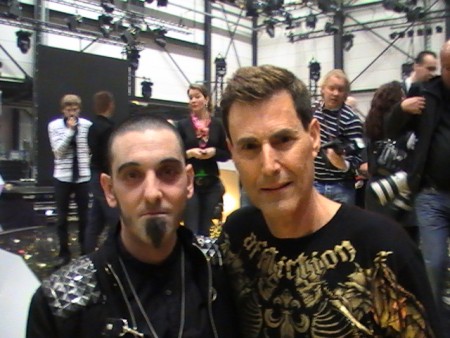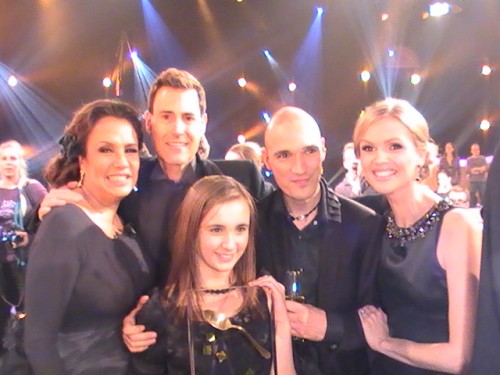finale buildup Cecile Verwaaijen Paolo Coelho Alistair Hardy
It’s been a roller-coaster week and I’m still moving at 90mph, so hang on tight — this week’s column is going to be a non-stop white knuckle ride.
As he takes the glass, he asks your to pluck a hair from your head, clip a fingernail or even spit into the glass. With a sliver of your own body, your DNA, in the drink, he downs it in one. And then he looks into your eyes and reads your mind like a forbidden book.
That was the extraordinary performance by one of the finalists in my Dutch show. Rumours were flying round the studio before he took the stage that the vampiric Vincent would perform such a gross act that he’d be kicked off the programme, and the series itself might be banned.
He had already eaten live worms, chewed leeches and drooled their blood, and burned his bare scalp with dry ice. There were times when just watching him had made me want to throw up, and the show’s millions of viewers have no doubt about me reaction to him — I think it’s sickening that any performer can degrade his talents this way, especially when there’s a real danger that children could make themselves ill by copying him.
But I’m the host, not the producer. I don’t pick the acts — and I don’t vote for them either. That’s the viewers’ prerogative, and phonelines have gone into meltdown every time he’s on screen. Hundreds of thousands reach for their mobiles, either to vote or to complain.
But he faces strong competition, not least from a twelve-year-old girl, Yelle, and her father, Ghani. Together they seem to share a telepathic link which is mystifying and magical.
Their act seems flawless, pure and beautiful to me. I was speechless when one of the celebs whispered a message into a glass and Ghani poured it into the tank of water where his daughter sat, submerged. Bubbles floated up from her eyelids and, as she emerged from the water, she spoke the message. It was like watching a scene from a fairytale.
The performer who has aroused the most controversy, though, is simply sttyled “The Mask”. No one has seen his face, despite an assault by two masked ‘fans’ from the audience, who leapt on him during this week’s show and tried to tear away his metal faceplate.
Conflicting theories make daily headlines in Amsterdam as journalists try to reveal the Mask’s true identity. Some say it is my daughter Natalie, or even my wife Hanna. Others hint at Hans Klok, Holland’s most famous mentalist, or my US co-star Criss Angel. There’s even a story that he’s a ghost… the Phantom of the Studio.
Win or lose, the Mask is guaranteed front-page headlines when the truth is revealed. 
Captions: These lambs were just a week old, and absolutely adorable. One of the mentalists, Joachen, brought them for his act. It seems the public would rather see Vincent guzzling leeches than Joachen’s lambs, though, for they voted him off the show.
The spectacular graphics on the set are designed for each contestant by a dedicated team of computer artists, just one of the reasons why my series employs 250 people behind the scenes.
** 
When I saw the serene and wise face of this child staring at me from the gloom in an Amsterdam theatre, I knew it was painted from life — and I had to know the name of the artist. My intuition told me that this young boy was a mystic soul, but I couldn’t guess where the portait had been painted.
It had an Eastern feel, as though the child live in a Buddhist monastery high in the Himalayas, but the abstract background reminded me of Moorish art.
When I met the artist, Cecile Verwaaijen, I was facinated to hear the boy, whose parents are Turkish, is a huge fan of Der Nieuwe Uri Geller.
I told Cecile her work reminded me of the Russian genius, Tretchikoff, who created the best-selling image of the 20th Century — the Green Lady or Chinese Girl. His canvases sell for millions, and I believe she has the talent to become an art superstar too.
**
When I was invited to speak at Oxford’s renowned Debating Society a couple of years ago, I was surprised that many of the students seemed to regard atheism as part of science. Anyone who believed in scientific progress could not believe in God, they seemed to think.
Of course, many of the world’s greatest scientists, including Einstein and Newton, have been profoundly religious men, and I was fascinated this week to learn of another — Professor Alister Hardy, who was head of zoology at Oxford after World War Two as well as president of the British Society for Psychical Research.
His biographer, David Hay, called me to ask whether I believed, as Hardy did, that paranormal phenomena belonged to the same dimension as religious experience. I told him there was no doubt in my mind that all human potential comes from a higher power — it’s God-given.
We use barely ten per cent of our brains, but often our mental potential is so powerful that it erupts from our subconscious minds. And when that happens, it can produce miraculous effects.
David told me that Professor Richard Dawkins was a pupil of Hardy. I wish they’d spent more time discussing the importance of faith in God, and less about evolution.


Latest Articles

Motivational Inspirational Speaker
Motivational, inspirational, empowering compelling 'infotainment' which leaves the audience amazed, mesmerized, motivated, enthusiastic, revitalised and with a much improved positive mental attitude, state of mind & self-belief.





















